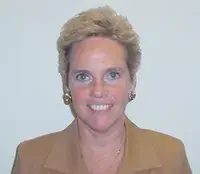 Transportation Security Inspector (TSI) Chris Suski and a fellow TSI keep a close eye on a plane about to land. (Photo courtesy of Chris Suski)
Transportation Security Inspector (TSI) Chris Suski and a fellow TSI keep a close eye on a plane about to land. (Photo courtesy of Chris Suski)
TSA inspectors often fly under the radar when it comes to the agency’s transportation security operations. Although we don’t hear a whole lot about inspectors, they play a key role in protecting our nation’s transportation systems.
Aviation, cargo, and surface inspectors conduct inspections, assessments, and investigations of transportation entities to identify potential vulnerabilities and determine how well they are complying with regulations. It’s up to supervisory transportation security inspectors (STSIs) to make sure our inspectors have what they need to get the job done in the field.
Erin Moran and Chris Suski lead a group of inspectors – Moran at Miami International Airport and Suski out of Dallas Love Field. Suski said it takes a lot of planning.
“I have to forecast headquarters’ wants and needs, what my federal security directors, assistant federal security directors-inspections want and need, how our work plans and investigations are going to be laid out, and compare that to my personnel,” said Suski. “It’s forecasting not just today, not just tomorrow, not just next week, but a quarter, two quarters, three quarters in advance to create a plan, but also be flexible to adjust that plan, because we have items we cannot forecast. For example, the lack of funding and (congressional budget) continuing resolutions.”
Moran believes many of our nation’s STSIs may feel underappreciated, but they play a crucial role in TSA’s transportation security efforts and aviation, cargo, and surface partnerships.
“They are the ultimate ambassadors of regulatory compliance across the country,” Moran said. “We are the ambassadors for external and internal stakeholders.”
Biggest threat to aviation security?
Both Moran and Suski say the insider threat is our biggest threat to aviation security today.
“I don’t think we really understand the scope of how big it could be,” said Moran. “Based on some of the work we’ve been doing recently here with badging and access control, and with some of the incidents we’ve had, leads me to believe the insider could be our biggest threat, especially with an economy that has seen inflation following COVID.
“People kind of let their guard down and forgot the basics of what they do. I think they could be easily influenced to get involved in some nefarious activities since they have access or knowledge of what happens at an airport.”
Suski adds the unknown is also a big threat.
“We only know what we know,” he assessed. “It’s that unknown that we may not have thought of that is scary.”
Cyber’s role in inspections
Suski said cybersecurity is a hot topic today.
“It’s a vulnerability in any mode of transportation with cargo, aviation, or surface,” he said. “After 9/11, we focused on aviation, and then we identified cargo as a threat, so we’ve shifted and focused more on cargo. Then, surface (security) came in.”
“Never did I think I would be sticking my head in the clouds to work on cyber doing this job,” added Suski. “But it’s definitely going to be a major part for the next couple of years until we can get our arms around it. Hopefully, it will level out to normalcy.”
Career progression for women
Moran would like to see more women hired as STSIs and other higher level positions across TSA and the federal government.
“I know we’re making positive progress,” said Moran. “There are so many talented females out there who would be great in this position, great in the inspector position. … If you know what you’re doing, and you’re doing the right thing, just hang in there and keep your seat at the table.”
Leadership model
As a leader, Suski said supervisors should be vulnerable, show their faults and take accountability for their faults.
“Let your team know we’re going to have missteps,” he emphasized. “Use those missteps as learning opportunities, not as a way to penalize someone, but how do we learn from it? If we missed a deadline, how could we have done that better? How can we grow from this? … Be open to try something. To be perfect is not reasonable. To learn from failure is, so it’s just making sure the (team) knows it’s OK to fail.”
Suski also strongly encourages leaders to share their knowledge with others.
“To keep knowledge inside is a bad thing,” said Suski. “That’s why (Erin and I) share so much, so we can get the next group of absolute, capable people to take over when we’re ready (to retire). Keep your eyes on the wide picture, not just the narrow picture of what you’re doing. Learn as much as you can about the whole organization, so you better place yourself for the future.”
For people interested in becoming an inspector or any other TSA position, Suski said, “Apply, apply, apply! Do not be discouraged if you do not make the list the first one, two, three, four times and go through the interview process. Learn more when you’re in that process. … Don’t hesitate; just do it. If you’re offered the position, that’s the time to evaluate the actual information for that position to see if it’s going to work for you.”
By Don Wagner, TSA Strategic Communications & Public Affairs
Editor’s note: STSIs Moran and Suski participated in one of a series of Day in the Life panel discussions facilitated by Women Excel@TSA, an employee advocacy council born of the desire to present a unified body of people interested in the retention and cultivation of female talent


